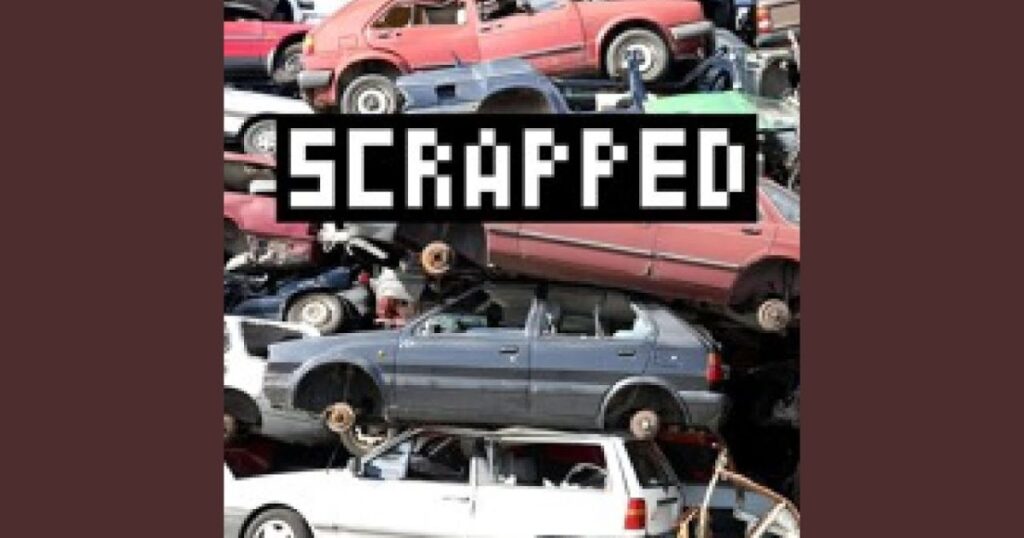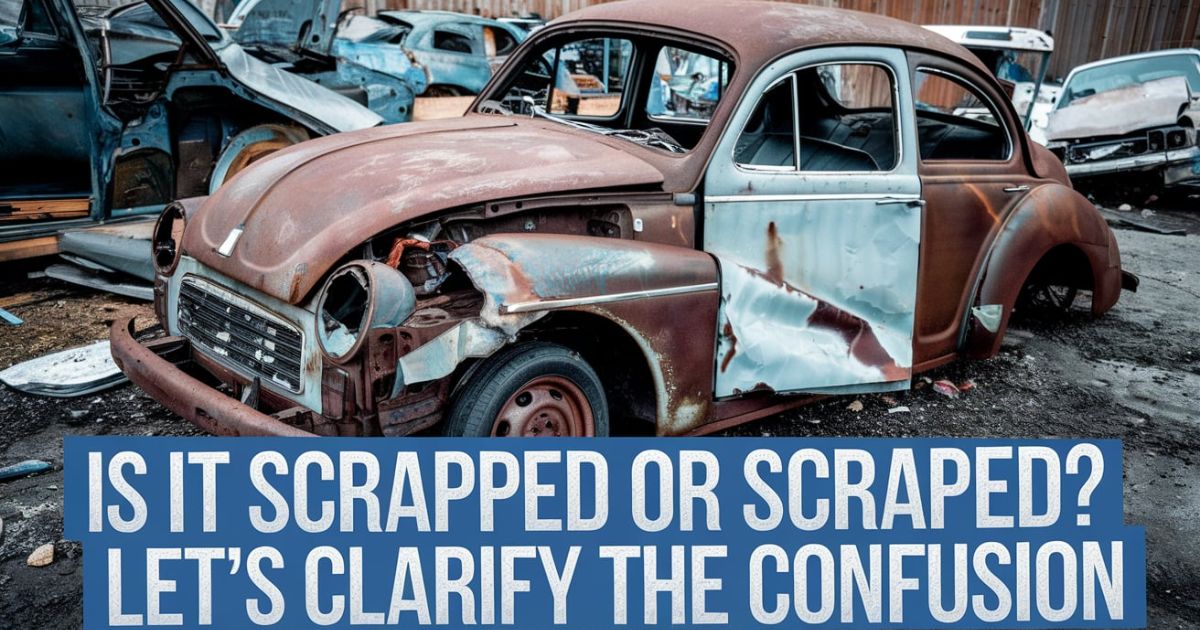It’s common for people to mix up certain English words. Sometimes, they look and sound alike but mean entirely different things. One such example is scrapped or scraped. At first glance, they appear to be nearly identical, differing by just one letter. Yet, their meanings and applications are completely distinct. In this article, we’ll dig into the differences between scrapped and scraped, explore when and how to use each, and give you useful tips to keep them straight.
Whether you’re a student, a writer, or simply a curious learner, understanding these words will improve your writing and speaking precision.
Why is There Confusion?
In English, words like “scrapped” and “scraped” can be confusing because they’re homophones—words that sound alike but differ in meaning. Homophones are especially challenging because, without a clear understanding of the definitions, people often end up using the wrong word.
This kind of confusion is typical even among native English speakers, especially when it comes to writing. Given that scrapped and scraped can relate to discarding, damage, or removal in various ways, it’s no surprise they get mixed up. To make it easier, let’s break down the definitions and contexts where each word is appropriate.
READ MORE: Totalling or Totaling: Which Spelling to Use?
What Does the Word “Scrapped” Mean?
The word “scrapped” is the past tense of scrap, meaning to discard, abandon, or cancel something. This often applies to plans, ideas, or physical objects that are no longer wanted or useful. When something is “scrapped,” it’s typically gone for good.
Think of “scrapped” as a decisive action, one that ends something entirely. You may scrap a project, scrap an idea, or even scrap an old car. This word implies that whatever was scrapped is no longer in use or has been completely abandoned.
Common Contexts for Using “Scrapped”
- Projects or Ideas: “The school scrapped its plan to hold classes outside due to weather.”
- Objects: “Her old laptop was finally scrapped after years of use.”
- Policies or Laws: “The government scrapped the proposed regulation after much debate.”
In these examples, scrapped conveys a sense of finality—something was discarded or put aside permanently.
What Does the Word “Scraped” Mean?
The word “scraped” is the past tense of scrape, which usually refers to a physical action of scratching, rubbing, or removing a surface layer. You might scrape a knee, scrape paint off a wall, or scrape together some money. Unlike “scrapped,” “scraped” implies an action involving physical contact or an effort to collect or gather something.
Common Contexts for Using “Scraped”
- Injury or Contact: “She scraped her knee after slipping on the sidewalk.”
- Cleaning or Removal: “They scraped the old paint off the walls before repainting.”
- Effort to Gather: “He scraped together enough money for a ticket.”
Each of these examples shows scraped as involving a physical action or an effort. It’s often used in situations where something is being removed by rubbing or when collecting something in small amounts.
scrapped or scraped: Differences
Understanding when to use “scrapped” vs. “scraped” hinges on the specific meanings and situations in which they’re used. Here’s a breakdown to simplify:
| Aspect | Scrapped | Scraped |
| Definition | To abandon, discard, or cancel something | To scratch, rub, or remove a surface layer |
| Usage | Used in contexts involving cancellation | Used in physical actions or gathering efforts |
| Examples in Context | “The plan was scrapped due to budget cuts.” | “She scraped her knee while playing soccer.” |
| Emotion or Tone | Indicates a final decision | Indicates physical action or struggle |
| Relation to Action | Typically figurative, relating to plans | Literal, often involving direct physical impact |
This table highlights the key distinctions between the words and how you might choose the appropriate one based on the context and desired meaning.
Which One Should You Use: scrapped or scraped?
The question of whether to use scrapped or scraped is simple when you focus on the action involved.
- Use “scrapped” if you’re talking about discarding, canceling, or giving up on something. For instance, “The outdated policy was scrapped.”
- Use “scraped” if you’re describing physical contact, scratching, or the removal of a layer. For example, “She scraped her car’s paint on the curb.”
Quick Memory Tips
- Think of “scrap” as discard. If you’re tossing something away, “scrapped” is the correct word.
- Associate “scrape” with scratch. If an object, surface, or body part is affected physically, you’ll likely use “scraped.”
Examples in Context
It’s always helpful to see words in action. Below are examples to reinforce the usage of “scrapped” and “scraped” in various contexts:
Examples of Scrapped
Project or Event Cancellation:
“The charity event was scrapped after a scheduling conflict.”
“Her vacation plans were scrapped due to last-minute work assignments.”
Object or Item Discarded:
“The old TV was scrapped and replaced with a newer model.”
“After several breakdowns, the car was finally scrapped.”
Idea or Plan Discontinued:
“They scrapped the proposal to build a new stadium.”
“The director decided to scrap the original script for the movie.”
Examples of Scraped
Physical Injury or Impact:
“He scraped his hand while trying to climb the fence.”
“She fell off her bike and scraped her elbow.”
Removing a Layer:
“The workers scraped the old paint off the walls before applying a new coat.”
“They scraped frost off the car’s windshield every morning in winter.”
Effort to Collect or Gather:
“He scraped together just enough money for the trip.”
“She scraped by with minimal supplies after the budget cuts.”
Seeing these examples can help you choose the correct word in similar situations.
Synonyms and Similar Terms to scrapped or scraped
Using synonyms can sometimes make writing clearer, especially when a word is easily confused with another. Here are some alternatives to scrapped or scraped to help broaden your vocabulary and provide options.
Synonyms for Scrapped
- Abandoned: Suggests leaving something completely.
- Canceled: Often used for events, orders, or plans that were scheduled but then stopped.
- Dismissed: Implies disregarding or deciding against something.
- Removed: Indicates taking something away, often permanently.
- Eliminated: Can be used to indicate complete removal.
Synonyms for Scraped
- Rubbed: Often used when an object or surface is pressed and moved against another.
- Scuffed: Implies light scratching or damage on a surface.
- Scratched: Closely related, involving a surface being lightly or deeply marked.
- Grazed: Used when a surface is lightly touched, often resulting in a minor mark.
- Cleared: When referring to removing a layer, like clearing ice off a windshield.
These synonyms provide alternate ways to express ideas if scrapped or scraped doesn’t feel quite right.
Origins of scrapped or scraped

Understanding the origins of words can make it easier to remember their meanings and usage.
Origins of “Scrapped”
The term scrap has roots in the Old Norse word skrap, meaning leftovers or pieces. The idea of discarding something came from the notion of leftover or discarded pieces of material. Over time, scrap evolved to mean giving up on or getting rid of something, especially items or ideas that no longer serve a purpose.
Origins of “Scraped”
Scrape comes from the Middle English word scrapen, meaning to scratch or rub. The idea was originally tied to physical actions—scraping a surface, scratching something off, or removing a layer. This literal meaning has been retained over centuries, which is why scraped still involves physical contact or removal.
Tips for Remembering “Is it Scrapped or Scraped?”
Using mnemonics and visual examples can help clarify which word to use in different scenarios.
- Visualize: When you think of scrap, imagine a pile of discarded items. It represents what’s left after something is abandoned. In contrast, scrape involves a motion or an action, like scraping mud off shoes.
- Storytelling: Create a story where you scrap an idea (throw it away) versus a story where you scrape a knee (physical contact). These mental stories can help make the differences more memorable.
FAQ’s
Which is correct, scrapped or scraped?
It depends on the context. Scrapped means to cancel or discard something, while scraped refers to removing a layer or making a mark through contact.
What is the difference between scrap and scraping?
Scrap means to discard or throw away something entirely, while scraping involves removing a surface layer by rubbing or scratching.
What does it mean to be scrapped?
To be scrapped means to be discarded, canceled, or abandoned, often referring to ideas, projects, or objects.
How do you use scraped in a sentence?
“She scraped her knee when she fell off her bike.”
ALSO READ: What’s the Plural of Software? Is it Software or Softwares?
Conclusion
Words like scrapped or scraped may look similar, but they have very different meanings. Scrapped means abandoning or discarding, while scraped involves physical removal or scratching. Understanding these differences helps prevent common mistakes in both writing and speaking. Next time you’re unsure which to use, remember to think about the context and follow the tips provided here. With practice, you’ll get the hang of it and use both words with confidence!
Sources
Merriam-Webster Dictionary
- Provides definitions, usage examples, and etymology for “scrap” and “scrape.”
Merriam-Webster
Oxford English Dictionary
- Offers detailed definitions, word origins, and examples of usage for both terms.
Oxford English Dictionary
Grammarist
- Discusses the differences between similar words and provides examples and clarifications on “scrapped” vs. “scraped.”
Grammarist
Cambridge Dictionary
- Offers clear definitions, examples, and comparisons of the two words, along with their usage in different contexts.
Cambridge Dictionary

Osbert is a skilled linguist and educator specializing in English grammar and vocabulary. With years of experience, he has dedicated his career to helping learners enhance their language skills. Osbert is passionate about simplifying complex grammar concepts and is the founder of EnglishInfoz.com, a platform focused on English language education.
